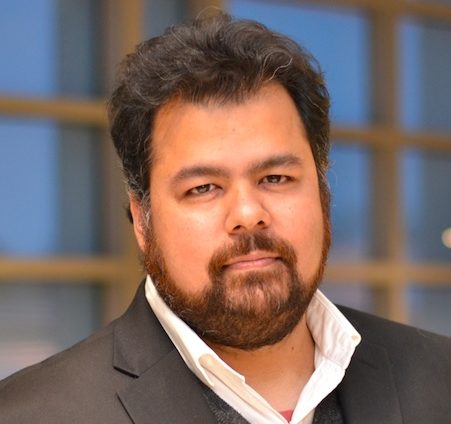Dr. Gaurav Chopra Assistant Professor
Purdue University

Gaurav Chopra is an Assistant Professor in the Department of Chemistry at Purdue University and a core member of the Purdue Center for Cancer Research, Purdue Institutes of Drug Discovery, Integrative Neuroscience, Inflammation, Immunology and Infectious Disease. His laboratory brings together four very different fields of science, namely, chemistry, immunology, virtual reality, and machine learning to study chemical environments from atomic to molecular to cellular scales with a theme of Chemical Immunology. Chemical environments and their dynamics at different scales (atomic, molecular and cellular interactions) encode properties that are hard to quantify analytically but essential to understand chemical processes in diseases (cancer, diabetes and neurodegeneration). Chopra was born in Delhi, India and received his B.Tech. at the Indian Institute of Technology, Delhi in Mechanical Engineering. He obtained his M.S. in Computational Mathematics, and Ph.D. in computational structural chemistry/biology with Dr. Michael Levitt (2013 Chemistry Nobel Laureate) at Stanford University developing proteome scale methods for drug discovery. As a JDRF fellow, he trained in experimental immunology with Dr. Jeffrey A. Bluestone (University of California, San Francisco) to understand the role of regulatory T-cells (Tregs) in type 1 diabetes. Chopra laboratory use machine learning to develop ‘computational assays’ to complement and guide chemical synthesis and biological experiments to identify targets/networks to design drugs/combinations for specific immune cell types. Chopra and collaborators in schools of medicine worldwide have used this approach to identify putative drug leads (new synthetic leads, combination of existing drugs) using in vitro and in vivo preclinical studies for more than 10 different diseases including cancer, immunological, metabolic, infectious and genetic indications (castration resistant prostate, invasive bladder cancer, type 1 diabetes, dental caries, dengue, herpes, drug resistant tuberculosis, etc). He has published a range of papers in PNAS, Cell-Immunity, Drug Discovery Today, Jounals of Clinical Investigation and Immunology, among others. Chopra is also passionate about innovation in the area of education and engaging the public for molecular visualization and discovery. To this end, his lab has developed a virtual reality environment toolbox for molecular exploration, MINT (Molecular Interactions using New Technologies), as an educational and scientific research “game” where the chemistry principles of molecular interactions are taught using a dynamic immersive environment guided by the CANDIY (Chemical Algorithms for Network based Decisions on Interactions for modeling reactivity, aka Can-do-it-yourself) programming suite from his laboratory (tutorials available on our YouTube channel – chopralab). The goal of MINT game is two-fold: discover chemistry concepts using a gaming environment to make it fun, and, to engage citizen scientists by crowdsourcing this game for drug design with a vision to enhance computational algorithms in drug discovery.
